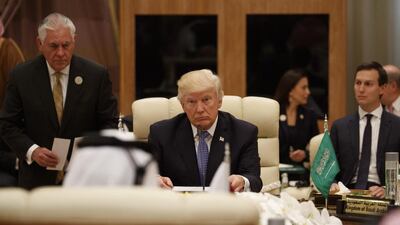Iran’s state-owned newspapers have been cheering Qatar’s recent behaviour. Iranian leaders also appear to applaud the rift between Qatar and other members of the Gulf Cooperation Council.
For Iran’s ruling Shia clerics, the increasing division between Doha and other Arab nations is a significant victory.
First of all, the rift plays right into a core pillar of Iran’s regional and foreign policy: the divide-and-rule doctrine. When Donald Trump made his first foreign trip to Saudi Arabia, Tehran was alarmed. After many years of exploiting diplomacy, concessions and divisions, Iranian leaders became aware that the region’s realignment was under way. A powerful coalition and united front between the US and the GCC was formed to counter Iran’s regional ambitions.
Iran is not going to alter its foreign policy and revolutionary ideals. As a result, Iran’s tactical shift is to break up this coalition through various means. And for Iran, the key was Qatar. Iran is attempting to abuse the situation by sending a message to Washington and the international community that there is no unity in the GCC or among Arab nations.
Secondly, Iran is also rejoicing the fact that the divisions between Qatar and other GCC allies are diverting attention from the region’s geopolitical and security priority; which is confronting Iran’s military adventurism and expanding influence in the Middle East.
While the headlines are directed towards the rift between Qatar and other Arab allies, Iran is liberally increasing its financial, military, advisory, intelligence and weaponry assistance to Bashar Al Assad, Shia militias and some designated-terrorist groups in Syria. Iran’s Revolutionary Guard Corps and its elite wing, the Quds Force, are deploying more troops in Syria as well.
In Iraq, Iran is expanding its Shiite militia proxies, arming them and making political reality of these groups in order to further control the political destiny of the nation.
In Bahrain, Tehran is escalating its attempts to further infiltrate the system and generate chaos in order to advance the core pillar of its foreign policy.
In Yemen, Iran continues to deliver sophisticated arms to the Houthis which is exacerbating and radicalising the conflict.
Tehran is benefiting from the instability. Roughly four decades of the history of the Islamic Republic has shown that it is through chaos and crisis that Iran expands its influence.
What Qatar has failed to recognise is that Iran’s ruling Shia clerics will not serve Doha’s long-term economic, strategic and geopolitical interests. For Qatar, alliance with Arab nations and the US ought to be more important. For example, economically speaking, Qatar’s deals and trades with other GCC members and the United States significantly outweigh Doha’s business deals with Iran.
Qatar should be aware that geopolitically and strategically, Iran’s revolutionary political establishment is not sustainable.
In addition, if Qatar faces domestic challenges, Arab nations, not Iran, are more likely to assist Doha. Tehran will instead attempt to exploit the situation and infiltrate Qatar’s political establishment as it did with Iraq, Syria, Yemen and Bahrain.
Therefore, to preserve its long-term interests, Qatar needs to adequately address the deep contradictions in its foreign policy. Qatar cannot appear to appease Iran and its proxies while simultaneously projecting itself as an ally of other GCC members.
Qatar's foreign policy is also undermining the US-GCC united front to confront terrorism and Iran's military adventurism in the region. This is diverting attention from the underlying issue: Iran’s relentless pursuit of regional power.
In order to stop Iran’s pursuit of regional superiority, diplomacy is required to bridge the gap between Qatar and other Arab allies.
The US can play a crucial role as a mediator. Since the largest American base in the Middle East is located in Qatar, Washington can play a critical role in persuading Qatar through negotiations, diplomacy and political pressure to change its calculations. Meetings between Qatar and other GCC members would be crucial as well.
If these diplomatic initiatives are coherently implemented, they can lead Qatar to recalculate its political and economic priorities. It is not in the interest of Qatar to lose its relationships with Washington and other Arab nations for the Shia Iran, Hizbollah and other non-state actors.
In a nutshell, Iran is the major beneficiary of Qatar’s actions and the rift between Doha and other GCC allies. Tehran is freely advancing its expansionist policies, military adventurism and sectarian agenda.
When it comes to the division between Qatar and other Gulf members, Iran will definitely continue to add more fuel to the fire. Doha should wake up to that fact and change its calculations.
Dr Majid Rafizadeh is a leading Iranian-American political scientist, president of the International American Council and board member of the Harvard International Review
On Twitter: @Dr_Rafizadeh

